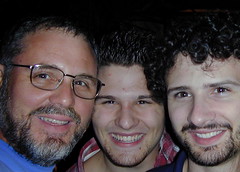Dead but Faithful
I just finished 1 Samuel, and started 2 Samuel. I love this narrative portion of Scripture, which is easily forgotten as we tend to spend a majority of our time in the NT. The stories are fascinating. The contrast between Saul and David is probably too familiar, and I have actually been pondering that dynamic frequently as of late (thanks to my Brother-in-law, Lyndon who gave me a short, yet insightful book called A Tale of Three Kings by Gene Edwards). However, on my latest reading through 1 Samuel, Jonathan has caught my attention more than any other character. The Narrator has nothing negative to say about Jonathan. Even though he would be next in line for the throne, he accepts the fact that David will be King. He loves David, and is intensely loyal to him. As Saul acts more and more obsessed/neurotic Jonathan continues to be faithful. You start to really like him, and wish that he could be David’s right-hand man (which is actually Jonathan’s wish, too). So, it’s a huge disappointment when you get to the last chapter, and realize that Jonathan dies in the prime of his life in a battle that was doomed from the beginning. My reaction: Why, God? Why does Jonathan get the same fate as his father? He deserves better. He should have been David’s right-hand man. Then I began to realize that I have a lot of “If I do things reasonably right, things will turn out reasonably well for me” in my personal theology. Bad things aren’t supposed to happen to faithful saints. If you follow the rules, God is pleased and gives you the stuff. If the suffering people would just be more faithful, their lives wouldn’t be so bad. Jonathan throws a wrench in that kind of theology. In fact, the lives of all the apostles put a wrench in that kind of theology. John and Emily Haagan put a wrench in that kind of theology (beautiful Christian Father and daughter hit by a drunk, Emily dies, and John is disabled). I do not deny the fact that consequences follow actions (if I did, I would have to throw out a lot of the Proverbs). However, I think it’s time to confess God’s sovereign rule over the universe; it’s time to cling to the promise that, “God works for the good of those who love him…” It’s time to emphasize our eschatological hope, not for a happy & comfortable life, but in the resurrection of Jesus Christ. Jonathan is my hero, because he was faithful. A tragic death? A waste? That depends on your perspective. God is God, and He answers to Himself. He doesn’t show us what the story would look like if Jonathan had lived. He died young, but he died faithful. Lord, let me be faithful!






